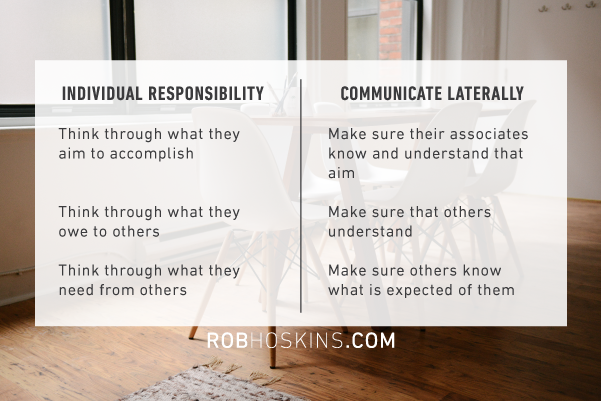Every organization desires to be healthy and effective. But this is not easy to do in an emergent culture of knowledge workers.
I love learning from management guru Peter Drucker and finding ways to apply his insights in a practical way. So I thought I would share the top 4 Drucker principles that every organization should implement for the health and success of its most important asset—people—in 2016.
The ultimate goal of organizations is no longer about processes or products, but about figuring out how to manage people. The critical, determining factor between organizations that struggle or those that succeed is if they have figured out how to make peoples’ strengths effective and their weaknesses irrelevant.
[easy-tweet tweet=”The ultimate goal of organizations is figuring out how to manage people” user=”RobHoskins”]
As opposed to the top-down management systems of earlier centuries, we must now figure out how to manage knowledge workers within a system characterized by individual responsibility and lateral communication…
Effective management enables the enterprise and each of its members to grow and develop as needs and opportunities change. And in a sea of change, the ability and empowerment of your people to adapt quickly will determine whether your organization will sink or swim.[1]
Good managers double as social ecologists. They take a hard look at society and ask:
- What paradigm changes have taken place recently?
- What changes no longer fit what everybody knows?
- Is there evidence that this is a change and not just a fad?
- If this change is relevant and meaningful, what opportunities does it offer?
Consider the passage of the GI Bill of Rights in the United States after the Second World War. This law gave every returning war veteran the right to attend college at the government’s expense. But beneath the surface, it signaled the emergence of knowledge as a key resource within society.
Taking a look at the impact this unprecedented change would have on expectations, values, social structure, employment, and more made it clear that knowledge as a productive resource had attained a position in society as never before in human history.
[easy-tweet tweet=”In a sea of change, your people’s ability to adapt quickly determines whether you sink or swim”]
Ten years later, by the mid-1950’s, one could confidently talk of a “knowledge society,” of “knowledge work” as the new center of the economy, and of the “knowledge worker” as the new, ascendant workforce. [2]
It begs the question today, which is why I have written extensively on what changes are needed in the workforce with retiring Boomers and Busters and the emergence of Millennials. Social ecology is needed to fully equip organizations not just to react to this digital savvy, socially committed, highly self-directed and globally aware workforce, but also to our need to proactively transform around them.
You might immediately jump to thinking of your bottom line as the key thing to measure, but what about the important results that elude easy measurements? For example, your organization’s ability to attract or retain good people. This is as much a hallmark of your chances of survival as the profit you turned that quarter.
Some things can be measured well by objective measures while others require more perceptual or subjective.
[easy-tweet tweet=”Balancing the measurable and non-measurable is a central and constant tension of management”]
Drucker suggests this strategy: “Develop quantitative assessments for those variables that can be so measured and qualitative assessments for those critical variables that are qualitative.” [3]
At an organizational level, you do well to have four quadrants of effectiveness:
- Organizational Capacity
- Organizational Outcomes
- Program Capacity
- Program Outcomes
Each of these categories have both objective and perceptual/subjective measurements that really matter.[4]
Not long before he died in 2005, Drucker declared that increasing the productivity of knowledge workers was “the most important contribution management needs to make in the 21st century.”
That is because the most dominant factor of our post-capitalist society is the shift to a knowledge society. Drucker offered the following five key ideas to organizations about how to operate effectively by engaging the contribution of knowledge workers:
- Figure out what information is needed. “Information…enables knowledge workers to do their job.” In our hyper-connected society, we have endless access to data at our fingertips. “An adequate information system,” Drucker wrote, must lead organizations “to ask the right questions, not just feed them the information they expect.”
- Actively prune what is past its prime.We all love to be innovative, but we hate to cut programs or positions. “Every organization will have to learn to innovate,” Drucker wrote. “And then, of course, one comes back to abandonment, and the process starts all over. Unless this is done, the knowledge-based organization will very soon find itself obsolescent, losing performance capacity and with it the ability to attract and hold the skilled and knowledgeable people on whom its performance depends.”
- Embrace employee autonomy. “Knowledge workers have to manage themselves,” Drucker advised. “They have to have autonomy.” Staff in the trenches or specialized areas are more likely to know what solution fits the problem than those in leadership above them. Empower them!
- Build a true learning organization.“If knowledge isn’t challenged to grow, it disappears fast,” Drucker cautioned. “It’s infinitely more perishable than any other resource we have ever had.”
- Provide a strong sense of purpose. “What motivates – and especially what motivates knowledge workers – is what motivates volunteers,” Drucker wrote. Among other things, “they need to know the organization’s mission and to believe in it.”
[easy-tweet tweet=”The time to apply these ideas to grow our organizational effectiveness is definitely now” user=”RobHoskins” hashtags=”leadership”]
Ours is “the first society in which ‘honest work’ does not mean a callused hand,” Drucker noted. “This is far more than a social change. It is a change in the human condition.” [5]
Drucker’s insights may have been far ahead of his time, but the time to apply these ideas to grow our organizational effectiveness is definitely now.
Related:
- 6 Ways to be a Better Leader in 2016
- Teaching the next generation to lead with influence
- How to build a leadership Dream Team









1 Comment
Hey Rob. I loved this article. So relevant for us at Growing Leaders. We value your insight and friendship.
–TE